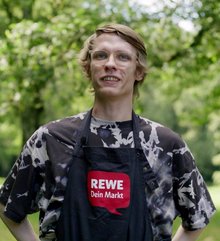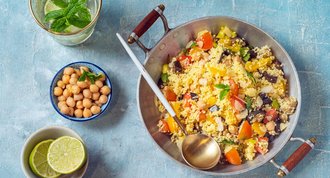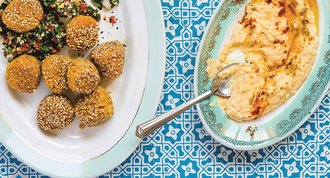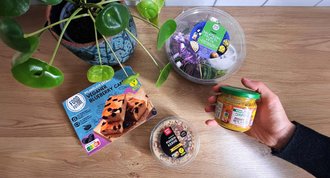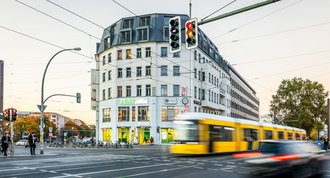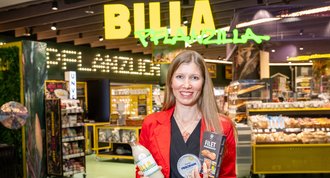
Many people believe that protein supply could be critical in a plant-based diet, as animal products are regarded as important sources of protein. But is this really true? Nutritionists Miriam Plogmann, Head of Quality Management Fresh/Frozen, and Pia Thies, Junior Quality Manager, explain how a varied plant-based diet can provide all the protein you need.
Those who follow a vegan diet avoid animal products from meat, sausage and eggs to cheese. However, these products are important sources of protein - one reason why many believe that protein supply could be critical in a plant-based diet.
But is that really the case? "First of all, regardless of your diet, it is important to eat a varied diet and pay attention to protein sources, among other things," explains Miriam Plogmann, nutritionist and responsible for vegan alternative products at REWE Group's Quality Management department.
Pulses, grains and nuts provide protein
But what exactly does this mean for a plant-based diet? "The need for protein is often overestimated and frequently only associated with animal-based foods. However, there are numerous animal-free products that are rich in protein. The classics among plant-based protein sources are pulses. Beans, lentils, peas and the like contain between 5 and 15 grams of protein per 100 grams when ready to eat, depending on the product," adds Pia Thies, who is responsible for vegan alternative products in Miriam Plogmann's team. Tofu, for example, which is made from soya beans, contains around 16 grams of protein per 100 grams and is therefore an excellent source. Nuts and seeds also provide high amounts of protein, such as pumpkin seeds. At 35 grams per 100 grams, they also provide high amounts of protein. Pia Thies emphasises: "A balanced and varied diet that integrates various protein-rich foods is the prerequisite for sufficient protein intake."
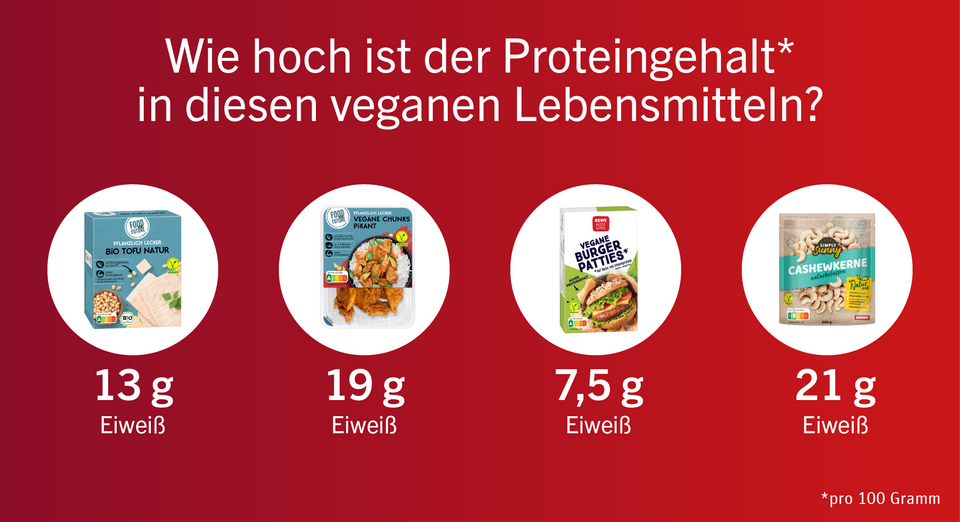
The combination makes the difference
People who integrate animal products into their diet have an easier time absorbing all proteins. Many plant-based protein sources do not provide sufficient amounts of all essential amino acids (see box). To avoid a deficiency, Miriam Plogmann recommends combining different foods: "The combination of pulses and wholegrain cereals is particularly favourable. A vegan diet can also provide all the essential amino acids." Examples of this are pasta with lentil bolognese, bread with hummus or a rice pan with peas.
And how much protein does a person need per day?
According to the German Nutrition Society (DGE), a healthy adult under the age of 65 needs around 0.8 grams of protein per kilogramme of body weight per day. "As a rule, this amount of protein can be easily absorbed through food, so supplementing with protein powder is not necessary," explains Pia Thies.
In certain phases of life, such as pregnancy, breastfeeding or old age, the protein requirement is increased. "Pregnant women in the second trimester should consume 0.9 grams, in the third trimester 1.0 gram and breastfeeding mothers 1.2 grams of protein per kilogram of body weight per day," explains Miriam Plogmann. For people over 65, the DGE recommends an estimated value of 1.0 gram of protein per kilogramme of body weight. In conclusion, Miriam emphasises: "If you integrate protein-rich foods such as pulses and wholegrains into your diet, you can also get enough protein from a plant-based diet."
5 facts for a plant-based protein supply
- It's all in here: Pulses such as beans, lentils or peas contain a lot of protein, and products made from wholegrain cereals and nuts or seeds are also very rich in protein. Products from these plant families should therefore be a regular part of your diet.
- Wonder bag: Most plant-based foods can be used in a variety of ways. For example, you can quickly make burger patties from kidney beans, lentils are perfect for a vegan Bolognese and silken tofu can replace dairy products in desserts.
- Essential or not? It is important that the essential amino acids that the human organism cannot produce itself are also included in the diet. If you want to be sure that you are well supplied with these nutrients, soya and quinoa are a good choice. They contain all nine essential amino acids and are therefore a good alternative to animal protein sources.
- It's all in the mix: If you include wholemeal products, pulses such as beans or peas and nuts in your meals and snacks, you can get all the essential amino acids.
- Need a little more? Pumpkin seeds are an excellent source of protein. There are 35 grams of protein in 100 grams of these small seeds. Soya beans can just about beat that with 38 grams of protein per 100 grams. For comparison: 100 grams of beef contains 26 grams of protein.
Proteins? Amino acids? A brief excursion into biology
Proteins consist of amino acids, of which there are a total of 20 different ones in the human body. Eight of these - nine in infants - are essential. This means that the body cannot produce them itself. They must be ingested through food. The remaining non-essential amino acids can be produced by the body itself under normal conditions.
About the person:
Miriam Plogmann studied nutritional and household sciences. She joined REWE Group in 2017 as Quality Manager and is now Head of Quality Management Fresh/Frozen, where she and her teams are responsible for the quality of fresh and frozen products.
Pia Thies studied molecular food technology. She started at REWE Group as a working student in March 2022. After completing her Master's degree, she then joined REWE full-time in operational quality management. Among other things, she is responsible for vegan alternative products.


